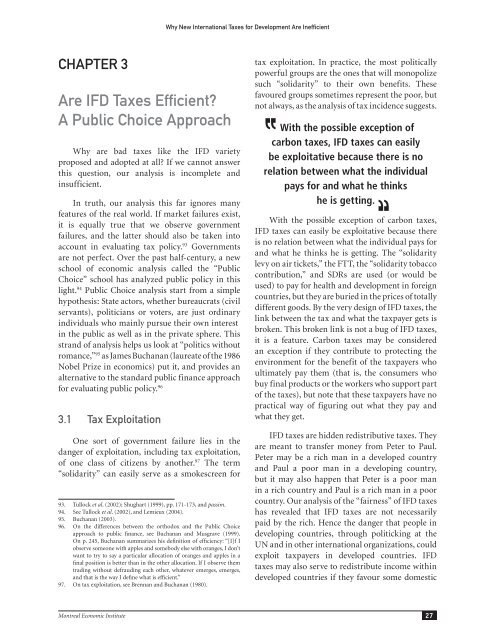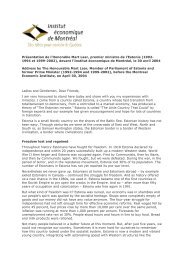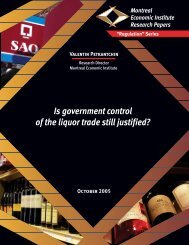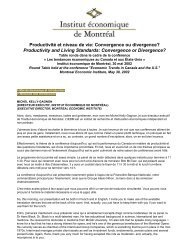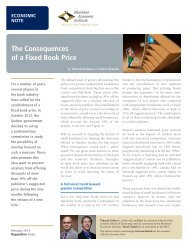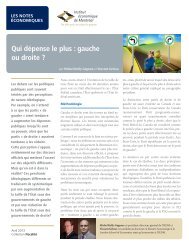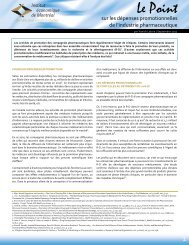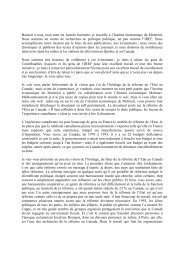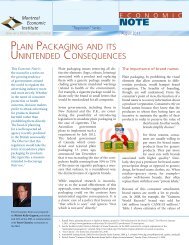Publication (PDF format) - Institut économique de Montréal
Publication (PDF format) - Institut économique de Montréal
Publication (PDF format) - Institut économique de Montréal
You also want an ePaper? Increase the reach of your titles
YUMPU automatically turns print PDFs into web optimized ePapers that Google loves.
Why New International Taxes for Development Are InefficientCHAPTER 3Are IFD Taxes Efficient?A Public Choice ApproachWhy are bad taxes like the IFD varietyproposed and adopted at all? If we cannot answerthis question, our analysis is incomplete andinsufficient.In truth, our analysis this far ignores manyfeatures of the real world. If market failures exist,it is equally true that we observe governmentfailures, and the latter should also be taken intoaccount in evaluating tax policy. 93 Governmentsare not perfect. Over the past half-century, a newschool of economic analysis called the “PublicChoice” school has analyzed public policy in thislight. 94 Public Choice analysis start from a simplehypothesis: State actors, whether bureaucrats (civilservants), politicians or voters, are just ordinaryindividuals who mainly pursue their own interestin the public as well as in the private sphere. Thisstrand of analysis helps us look at “politics withoutromance,” 95 as James Buchanan (laureate of the 1986Nobel Prize in economics) put it, and provi<strong>de</strong>s analternative to the standard public finance approachfor evaluating public policy. 963.1 Tax ExploitationOne sort of government failure lies in thedanger of exploitation, including tax exploitation,of one class of citizens by another. 97 The term“solidarity” can easily serve as a smokescreen for93. Tullock et al. (2002); Shughart (1999), pp. 171-173, and passim.94. See Tullock et al. (2002), and Lemieux (2004).95. Buchanan (2003).96. On the differences between the orthodox and the Public Choiceapproach to public finance, see Buchanan and Musgrave (1999).On p. 245, Buchanan summarizes his <strong>de</strong>finition of efficiency: “[I]f Iobserve someone with apples and somebody else with oranges, I don’twant to try to say a particular allocation of oranges and apples in afinal position is better than in the other allocation. If I observe themtrading without <strong>de</strong>frauding each other, whatever emerges, emerges,and that is the way I <strong>de</strong>fine what is efficient.”97. On tax exploitation, see Brennan and Buchanan (1980).tax exploitation. In practice, the most politicallypowerful groups are the ones that will monopolizesuch “solidarity” to their own benefits. Thesefavoured groups sometimes represent the poor, butnot always, as the analysis of tax inci<strong>de</strong>nce suggests.,,With the possible exception ofcarbon taxes, IFD taxes can easilybe exploitative because there is norelation between what the individualpays for and what he thinkshe is getting. ,,With the possible exception of carbon taxes,IFD taxes can easily be exploitative because thereis no relation between what the individual pays forand what he thinks he is getting. The “solidaritylevy on air tickets,” the FTT, the “solidarity tobaccocontribution,” and SDRs are used (or would beused) to pay for health and <strong>de</strong>velopment in foreigncountries, but they are buried in the prices of totallydifferent goods. By the very <strong>de</strong>sign of IFD taxes, thelink between the tax and what the taxpayer gets isbroken. This broken link is not a bug of IFD taxes,it is a feature. Carbon taxes may be consi<strong>de</strong>redan exception if they contribute to protecting theenvironment for the benefit of the taxpayers whoultimately pay them (that is, the consumers whobuy final products or the workers who support partof the taxes), but note that these taxpayers have nopractical way of figuring out what they pay andwhat they get.IFD taxes are hid<strong>de</strong>n redistributive taxes. Theyare meant to transfer money from Peter to Paul.Peter may be a rich man in a <strong>de</strong>veloped countryand Paul a poor man in a <strong>de</strong>veloping country,but it may also happen that Peter is a poor manin a rich country and Paul is a rich man in a poorcountry. Our analysis of the “fairness” of IFD taxeshas revealed that IFD taxes are not necessarilypaid by the rich. Hence the danger that people in<strong>de</strong>veloping countries, through politicking at theUN and in other international organizations, coul<strong>de</strong>xploit taxpayers in <strong>de</strong>veloped countries. IFDtaxes may also serve to redistribute income within<strong>de</strong>veloped countries if they favour some domesticMontreal Economic <strong>Institut</strong>e 27


